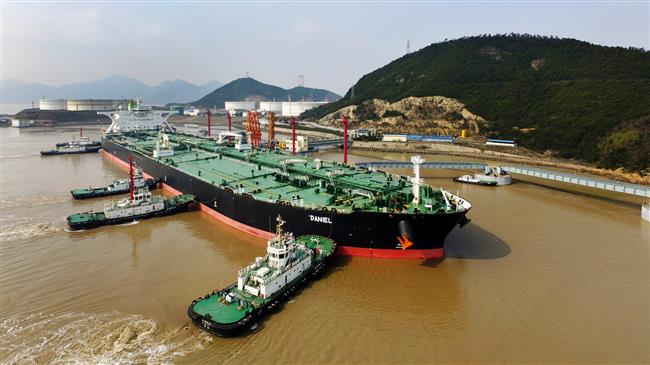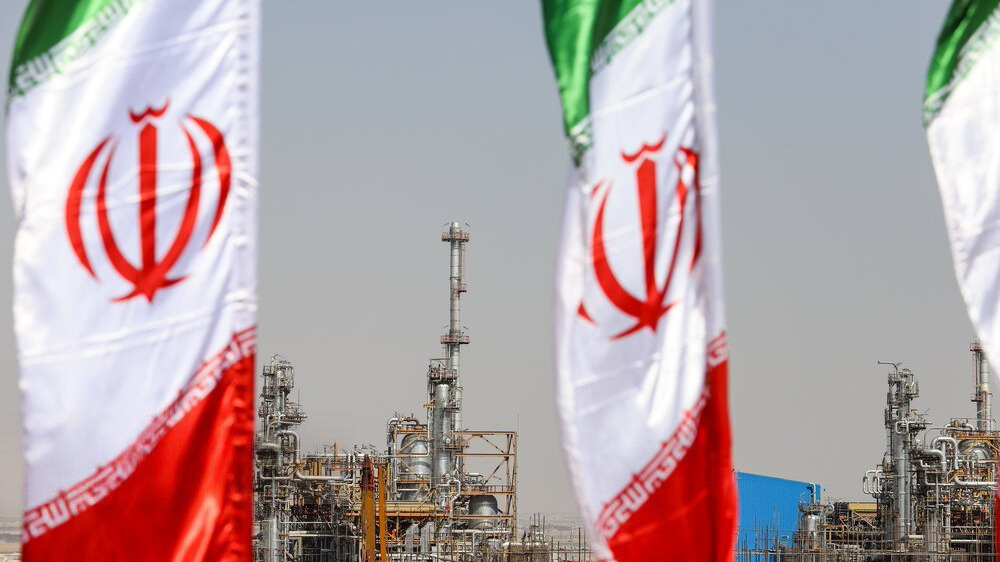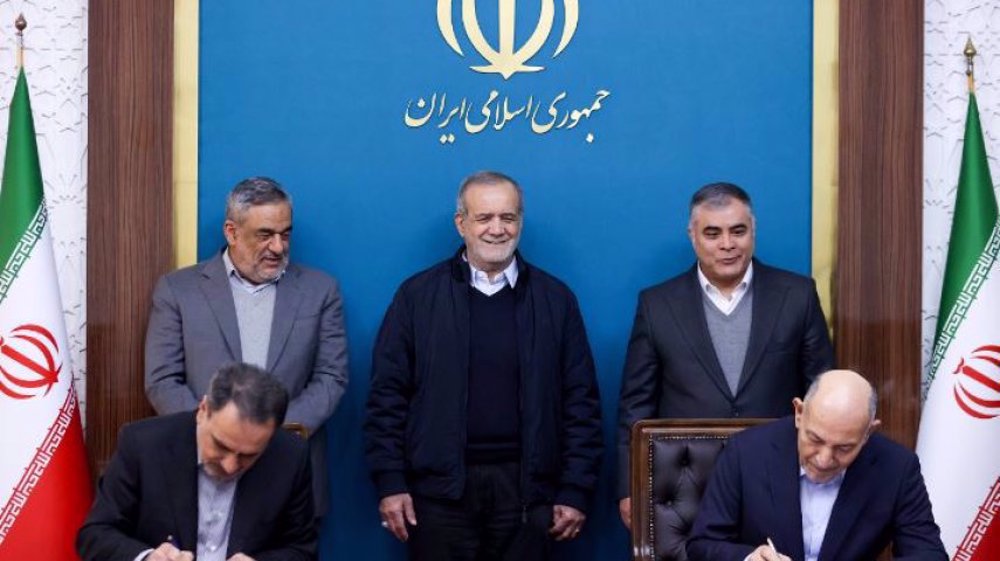Iran oil revenue dips but future holds bright promises
The Organization of Petroleum Exporting Countries (OPEC) says Iran's revenue from total crude oil exports and oil products in 2019 was just over $19 billion, less than a third of the previous year.
According to the organization’s annual report, Iran's income from selling oil and oil products amounted to 60.5 billion in 2018, while it was $110 billion in 2011.
Iran's average daily crude oil exports last year were 651,000 barrels per day, of which about 60,000 barrels went to Turkey and the rest to Asia, it said. In 2018, the figure was 1.85, and in 2017 more than 2.1 million barrels per day.
Iran’s oil industry is at the forefront of an economic war with the United States which has pledged to bring Tehran’s crude exports down to zero. The Islamic Republic exported around one million bpd until May 2019, when the United States tightened its sanctions, banning all oil exports from Iran.
The Iranian economy has been carrying on at a relatively steady clip after a period of turmoil when the Trump administration unleashed its most ferocious economic attack on the country in November 2018 with a pledge to sink its oil exports to zero.
According to OPEC, Iran also exported about 285,000 bpd of oil products including diesel and fuel oil last year.
Barring oil products, revenues from Iran's crude oil exports last year were less than $9 billion, government officials have said.
The OPEC report said Iran's total oil and non-oil exports reached $69 billion last year, down about a third from 2018.
Early this year, Industry Minister Hossein Modares Khiabani, then a deputy, told an exports quality summit in Tehran that Iran had exported $32 billion of non-oil goods in the 10 months up to January, shoring up its economy amid the unprecedented US sanctions.
“This is like a miracle in the current economic situation of the country,” he said. “Non-oil exports have almost replaced oil exports, and the country is governed by the revenues of the non-oil sector,” he added.
The Trump administration is gerrymandering, tweaking the contours of its sanctions regime to put more aspects of the Iranian economy under strain.
In recent months, the US Treasury Department has announced new sanctions against Iran's air and maritime transport industries, construction, manufacturing, textiles, mining, aluminum, copper, iron and steel industries to hit much of Iran’s economy as well as Chinese companies that have conducted business with Iran.
Iran-China partnership
China has long been Iran’s largest trading partner and the Islamic Republic is one of its major suppliers of oil. US officials have reportedly been working behind the scenes to pressure China into halting all its oil and condensate imports from Iran.
But recent reports of an imminent finalization of a roadmap for strategic partnership have put the kybosh on those reports.
On Sunday, The New York Times said the sweeping economic and security partnership would clear the way for billions of dollars of Chinese investments in energy and other sectors, undercutting the Trump administration’s efforts to isolate the Islamic Republic.
The paper said it had obtained details of an 18-page proposed agreement that would vastly expand Chinese presence in banking, telecommunications, ports, railways and dozens of other projects. In exchange, China would receive a regular supply of Iranian oil over the next 25 years, it said.
The partnership — first proposed by China’s leader Xi Jinping, during a visit to Iran in 2016 — was approved by President Hassan Rouhani’s cabinet in June, Foreign Minister Mohammad Javad Zarif said last week.
The deal “represents a major blow to the Trump administration’s aggressive policy toward Iran since abandoning the nuclear deal reached in 2015 by President Obama and the leaders of six other nations after two years of grueling negotiations,” The Times said.
Renewed American sanctions, including the threat to cut off access to the international banking system for any company that does business in Iran, have prompted Tehran to turn to China, which has the technology and appetite for oil that Iran needs.
China gets about 75 percent of its oil from abroad and is the world’s largest importer, at more than 10 million barrels a day last year.
The Chinese investments in Iran would reportedly total $400 billion over 25 years. China will invest $280 billion developing Iran's oil, gas and petrochemicals sectors. There will be another $120 billion investment in upgrading Iran's transport and manufacturing infrastructure.
Such an infusion would certainly help to revive Iran’s economy and create more jobs, according to Shireen Hunter, an affiliate fellow at the Georgetown University Center for Muslim-Christian Understanding.
“A major reason for Iran’s shift towards China and other Asian countries, known locally as the ‘pivot to the East’, has been the failure of Iran’s repeated efforts, beginning with the administration of Ayatollah Hashemi Rafsanjani, to expand economic relations with the West as a prelude to better political ties,” she wrote on the Middle East Eye news website.
Hunter cited the latest of Iran’s offers after the signing of the nuclear deal in 2015, including for buying Boeing and Airbus aircraft and welcoming American and European companies such as Total into the country – to which the West responded negatively.
“If the Iran-China agreement is implemented, it would revive Iran’s economy and stabilize its politics. Such an economic and political recovery would improve Iran’s regional position and perhaps incentivize adversaries to reduce tensions with Tehran, instead of blindly following US policies. Arab states could rush to make their own special deals with China,” she wrote.
“By pursuing an entirely hostile policy towards Iran, the US has limited its strategic choices in Southwest Asia and thus been manipulated by some of its local partners, such as Saudi Arabia and the UAE. China’s more pronounced interest in Iran should alert the US to review its past approach towards Tehran,” she added.
VIDEO | Press TV's news headlines
VIDEO | Istanbul demonstrators voice support for Iran amid US tensions
VIDEO | Israeli settlers attack Palestinian Bedouin community, injure 13
Palestinian Ambassador’s residence in Tehran attacked amid terror wave
Syria's HTS regime agrees to truce with SDF after its troops advance
EU mulls over $100bn in US retaliatory tariffs over Greenland
VIDEO | Trump's presence sparks major protests at Davos Forum
President Pezeshkian vows historical Iran-Iraq relations will remain stable












 This makes it easy to access the Press TV website
This makes it easy to access the Press TV website